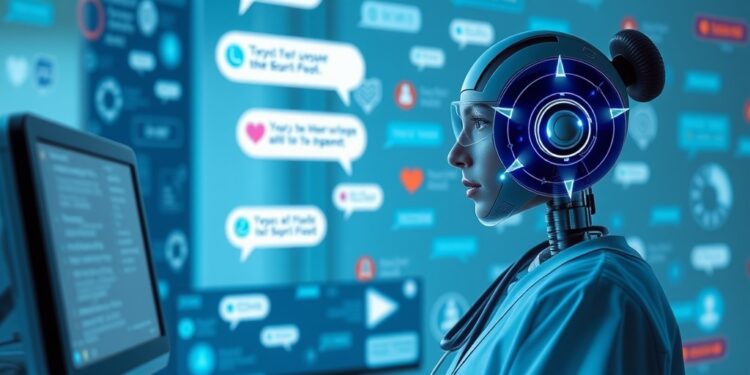In an intriguing development in the intersection of healthcare and technology, a recent survey led by Duke Health has unveiled compelling insights regarding patient interactions with artificial intelligence (AI) in clinical communication. This survey, conducted under the auspices of Duke University School of Medicine, garnered responses from over 1,400 participants who are part of Duke Health’s patient advisory committee. The aim was to understand patient preferences when receiving medical communications generated by AI compared to those crafted by human clinicians.
The survey stemmed from a crucial question in modern healthcare: as AI continues to permeate various sectors, how does its implementation impact patient trust and satisfaction? In an age where automation is on the rise, healthcare systems are grappling with the implications of using AI-generated content. Patients were presented with clinical scenarios addressing topics of varying seriousness, including routine medication refill requests, inquiries about medication side effects, and potentially serious findings such as cancer on imaging. Participants were then shown responses pre-crafted by either AI or a multidisciplinary team of physicians, creating a comprehensive framework for analysis.
What emerged from the survey was a noticeable preference among patients for responses formulated by AI. On a five-point satisfaction scale, participants rated AI-drafted messages significantly higher than those authored by humans—a difference of 0.30 points. This finding is particularly noteworthy when considering the nuances surrounding patient expectations and the need for comprehensive, empathetic communication in healthcare. The AI-generated messages tended to be longer and more detailed, characteristics that could contribute to perceptions of enhanced empathy. This trend challenges traditional assumptions regarding the superiority of human interaction in conveying care and concern.
The transparency of AI usage in these communications was another critical aspect of the study. When survey participants were informed that AI had played a role in drafting the response, there was a slight decline in satisfaction, approximately 0.1 points on the aforementioned scale. This reduction, although modest, prompts further questions about the balance between transparency and patient trust. Patients demonstrated a heightened level of satisfaction when they were not made aware of AI involvement, suggesting that while they may appreciate the efficiency and detail of AI responses, there remains an underlying concern about the authenticity of the communication.
Dr. Anand Chowdhury, one of the senior authors of the study, articulated the delicate balance needed in ensuring transparency with patients while also striving for efficient communication. He emphasized the ongoing dialogue within health systems about the appropriate disclosure of AI’s role, underlying a shared desire for openness alongside the need to maintain patient satisfaction. The findings highlight an evolving landscape where patients increasingly expect clarity without compromise to the quality of interaction.
As the healthcare landscape continues to shift towards digital solutions, the integration of AI in clinical communication will demand thoughtful implementation and evaluation. Healthcare systems will need to consider not only the efficiency gains but also the psychological and emotional ramifications of AI usage among patients. These findings may also influence policies regarding patient communication strategies, encouraging a more strategic approach to informing patients about the technologies employed in their care.
Moreover, this study raises additional questions regarding the future role of AI in healthcare beyond communication. For instance, how can AI effectively collaborate with healthcare professionals to provide a seamless patient experience? As the technology advances, exploring this synergy becomes crucial—one that maximizes the strengths of both human practitioners and AI capabilities.
As we delve deeper into the realm of generative AI, employing tools like ChatGPT in clinical settings can enhance not only communication but also the broader healthcare delivery itself. The prospect of AI optimizing workflow processes while ensuring patients feel heard and cared for presents a transformative opportunity for the sector. Therefore, continuous research and adaptation will be necessary to harness its full potential responsibly.
For patients, the essence of feeling cared for lies beyond mere information delivery. It encompasses a holistic approach, integrating empathy and understanding into their healthcare experiences. As such, the acceptance and effectiveness of AI as a therapeutic tool hinge on its ability to resonate with patients on an emotional level. Healthcare systems must diligently assess how these tools affect the interpersonal fabric of patient care.
In conclusion, the Duke Health survey provides a critical glimpse into the future of AI in medicine. By illuminating patient preferences towards AI-generated communications, the findings present both opportunities and challenges. As clinicians and healthcare organizations navigate this complex landscape, the goal will remain to harness these technologies in a manner that reinforces trust and improves patient outcomes, ultimately paving the way for a more integrated approach to healthcare.
Subject of Research: Patient preferences for AI-generated versus human-authored medical communications.
Article Title: Patient Preferences Lean Toward AI Responses in Clinical Communications
News Publication Date: March 11, 2023
Web References: Duke University Medicine
References: JAMA Network Open
Image Credits: Duke University Medical Center
Keywords
Generative AI, Healthcare Communication, Patient Satisfaction, Artificial Intelligence, Clinician Burnout, Medical Ethics.
Tags: automation in medical communicationDuke Health patient advisory committee findingshealthcare systems and AI integration challengesimpact of AI on patient satisfactionimplications of AI in modern healthcarepatient perceptions of AI technology in healthcarepatient preferences for AI versus human responsespatients’ trust in AI healthcare communicationresponses to serious medical findings by AIsurvey on AI in clinical communicationtrust issues with AI-generated medical messagesunderstanding patient interaction with AI in medicine





